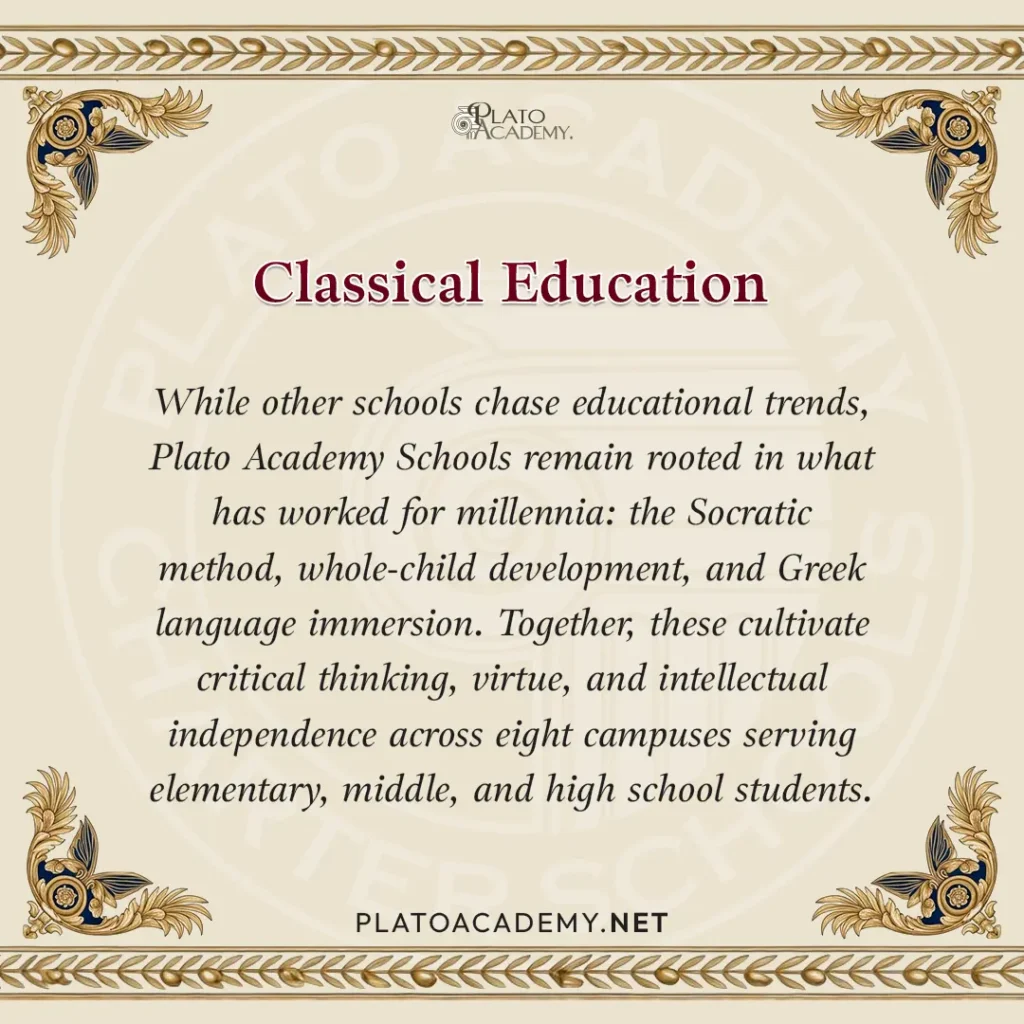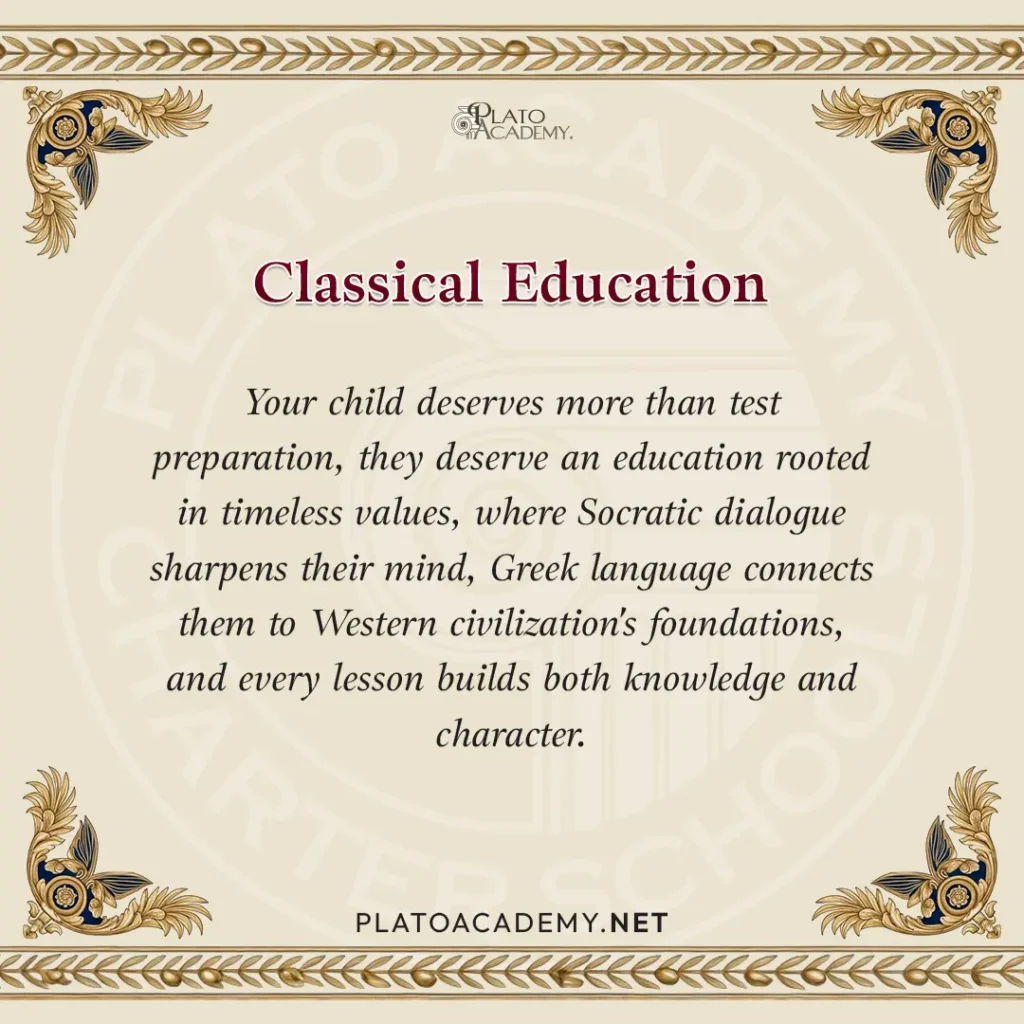In an era dominated by standardized testing and technology-driven instruction, Plato Academy stands apart by also focusing on what has worked for millennia: classical education. Established in 2004, this network of eight campuses has proven that teaching students how to think, rather than what to think, produces graduates who excel academically while developing the character and wisdom necessary for meaningful lives. Through the Socratic method, Greek language immersion, and a commitment to educating the whole child, Plato Academy delivers an education that prepares students not merely for college, but for the complexities of citizenship, leadership, and human flourishing.

The question parents face today is not whether their children will learn to read, compute, or pass standardized tests. Most schools accomplish these baseline goals. The real question is whether education will equip young people to think independently, engage complex ideas, understand their cultural inheritance, and develop the character necessary to navigate an increasingly complex world.
Classical education answers that question with a resounding yes. At Plato Academy, families discover an approach to learning that has stood the test of time precisely because it focuses on timeless human capacities rather than temporary trends.
The Socratic Method. Learning to Think, Not What to Think
Here is a typical lesson in a 4th grade classroom at Plato Academy during a literature discussion. The teacher is not lecturing from the front of the room. Instead, students sit in a circle, debating whether a character in a Greek myth demonstrated true courage. One student references a specific passage to support her interpretation. Another respectfully disagrees, offering textual evidence for an alternative view. The teacher intervenes only to pose questions: “What evidence supports that claim?” “Who sees it differently?” “How does this connect to your own experience?”
This is the Socratic method in action, the cornerstone of classical pedagogy. Rather than passively receiving information, students engage in structured dialogue that requires them to examine assumptions, consider multiple perspectives, and construct reasoned arguments. They learn that knowledge is not simply downloaded but discovered through rigorous inquiry.
Through the Socratic method, Greek language immersion, and a commitment to educating the whole child, Plato Academy delivers an education that prepares students not merely for college, but for the complexities of citizenship, leadership, and human flourishing.
The benefits extend far beyond the classroom. Students trained in Socratic dialogue develop critical thinking skills that serve them throughout life. They learn to evaluate arguments, identify logical fallacies, and articulate complex ideas clearly. In an age of misinformation and polarized discourse, these skills are not luxuries but necessities.
Perhaps more importantly, the Socratic method cultivates intellectual humility. Students discover that their initial opinions may be incomplete or flawed, that truth often reveals itself through collaborative inquiry, and that disagreement need not devolve into personal conflict. These lessons in civil discourse and open-minded investigation prepare students for democratic citizenship in ways that traditional lecture-based instruction cannot.
The Greek Advantage. Language, Culture, and Heritage
Plato Academy’s commitment to Greek language instruction sets it apart from virtually every other educational institution in the country. Beginning in kindergarten and continuing through eighth grade, students immerse themselves in one of the world’s most influential languages.
The decision to teach Greek is not arbitrary nostalgia. Greek is the language of Homer and Sophocles, of Plato and Aristotle, and Byzantine civilization. It is the language in which democracy was debated, tragedy was born, and philosophy first asked the deepest questions about justice, beauty, and the good life. To learn Greek is to gain direct access to the foundational texts of Western civilization.
But the benefits extend beyond literary appreciation. Learning Greek develops cognitive abilities in unique ways. The language’s complex grammar, with its cases, moods, and verb conjugations, trains students in precision and analytical thinking. Translating greek texts requires careful attention to nuance, context, and multiple possible meanings. These intellectual habits transfer to other disciplines, strengthening performance in mathematics, science, and English composition.

Moreover, Greek language study opens students to an entire cultural tradition. They encounter Greek mythology not as simplified children’s stories but as sophisticated narratives exploring timeless human dilemmas. They celebrate Greek culture through cultural events that connect them to a living tradition. They develop an appreciation for how ideas, values, and institutions evolve across time while retaining essential continuity.
In a globalized world that often feels rootless and fragmented, this deep engagement with Greek language and culture provides students with a sense of connection to something larger than themselves. They learn that they are heirs to a rich intellectual and cultural inheritance, one that continues to shape contemporary life in countless ways.
Educating the Whole Child. Beyond Test Scores
Perhaps the most profound distinction of Plato Academy’s approach is its refusal to reduce education to academic metrics alone. The school embraces a philosophy of educating the whole child, recognizing that genuine learning requires attention to social, emotional, physical, and cognitive development.
This commitment manifests in multiple ways. Socratic discussions do not merely teach literary analysis, they cultivate empathy as students learn to understand perspectives different from their own. Character education is not a separate subject relegated to occasional assemblies but woven throughout the curriculum. When fourth graders debate whether a mythological hero demonstrated courage, they are simultaneously exploring what courage means in their own lives and communities.The school recognizes that children learn best when they feel safe, supported, and genuinely known by their teachers. Strong relationships between educators and students create the foundation for intellectual risk-taking. Students who trust their teachers and peers are more willing to voice half-formed ideas, acknowledge curiosity, and engage in the sometimes confusing process of genuine learning.
When fourth graders debate whether a mythological hero demonstrated courage, they are simultaneously exploring what courage means in their own lives and communities.
Physical well-being receives equal attention. Plato Academy Schools understand that healthy bodies support healthy minds, that nutrition and exercise directly impact cognitive function and emotional regulation. Students learn that caring for themselves physically is not separate from intellectual development but integral to it.

This holistic approach produces students who are not merely knowledgeable but wise, not simply skilled but virtuous. They develop resilience, self-management, and the ability to form healthy relationships. They understand that success in life requires more than technical competence, it demands emotional intelligence, ethical reasoning, and the capacity to contribute meaningfully to communities.
Technology as Tool, Not Teacher
In an educational landscape often dominated by screens and algorithms, Plato Academy maintains a carefully balanced relationship with technology. Students use computers and digital resources, but these tools serve classical educational goals rather than replacing them.
Technology at Plato Academy enhances rather than supplants human interaction. Students might use computers to research ancient Greek city-states, but they discuss their findings in Socratic groups. They might type essays, but those essays grapple with timeless questions posed by classical texts. Digital tools increase efficiency and access to information, but they do not substitute for the irreplaceable work of thinking, discussing, and writing that defines genuine education.
This approach acknowledges a crucial insight: technology changes rapidly, but human nature remains remarkably constant. The questions that preoccupied Socrates, questions about justice, courage, friendship, and the good life, remain as urgent today as they were 2,400 years ago. An education grounded in engaging these perennial questions prepares students for their future precisely because it focuses on enduring human capacities rather than just technical skills.
Twenty Years of Proven Excellence
Since its founding in 2004, Plato Academy has grown from a single campus to eight locations serving families from kindergarten through twelfth grade. This expansion reflects parents’ recognition that classical education delivers results.

The proof appears not merely in test scores, though Plato Academy students consistently perform well on standardized assessments. More significantly, it appears in graduates who enter college prepared not just academically but intellectually. They know how to read difficult texts carefully, construct arguments persuasively, and engage ideas from multiple perspectives. They possess the character and resilience to navigate challenges. They understand themselves as part of a larger cultural and intellectual tradition.
Parents who initially approached classical education with skepticism often become its most ardent advocates. They witness transformations in their children: newfound confidence in expressing ideas, genuine excitement about learning, deepening capacity for independent thought. They discover that education can be something more than credential acquisition, it can be a formation in wisdom and virtue.
The Choice Before Parents
Educational decisions are among the most consequential choices parents make. In selecting a school, they are not simply choosing where their children will spend their days but determining what kind of people their children will become.
Plato Academy offers parents an alternative to educational approaches that reduce learning to data points and test preparation. It provides a time-tested model that has produced educated, thoughtful, virtuous citizens for millennia. It recognizes that children are not problems to be solved or products to be manufactured but human beings to be nurtured in all their complexity.
The classical education available at Plato Academy prepares students for lives of meaning and contribution. It equips them with knowledge, certainly, but more importantly with wisdom. It teaches them not merely to make a living but to make a life.
For parents seeking an education that honors their children’s full humanity while preparing them rigorously for the future, classical education at Plato Academy represents not a retreat into the past but an investment in enduring excellence.
